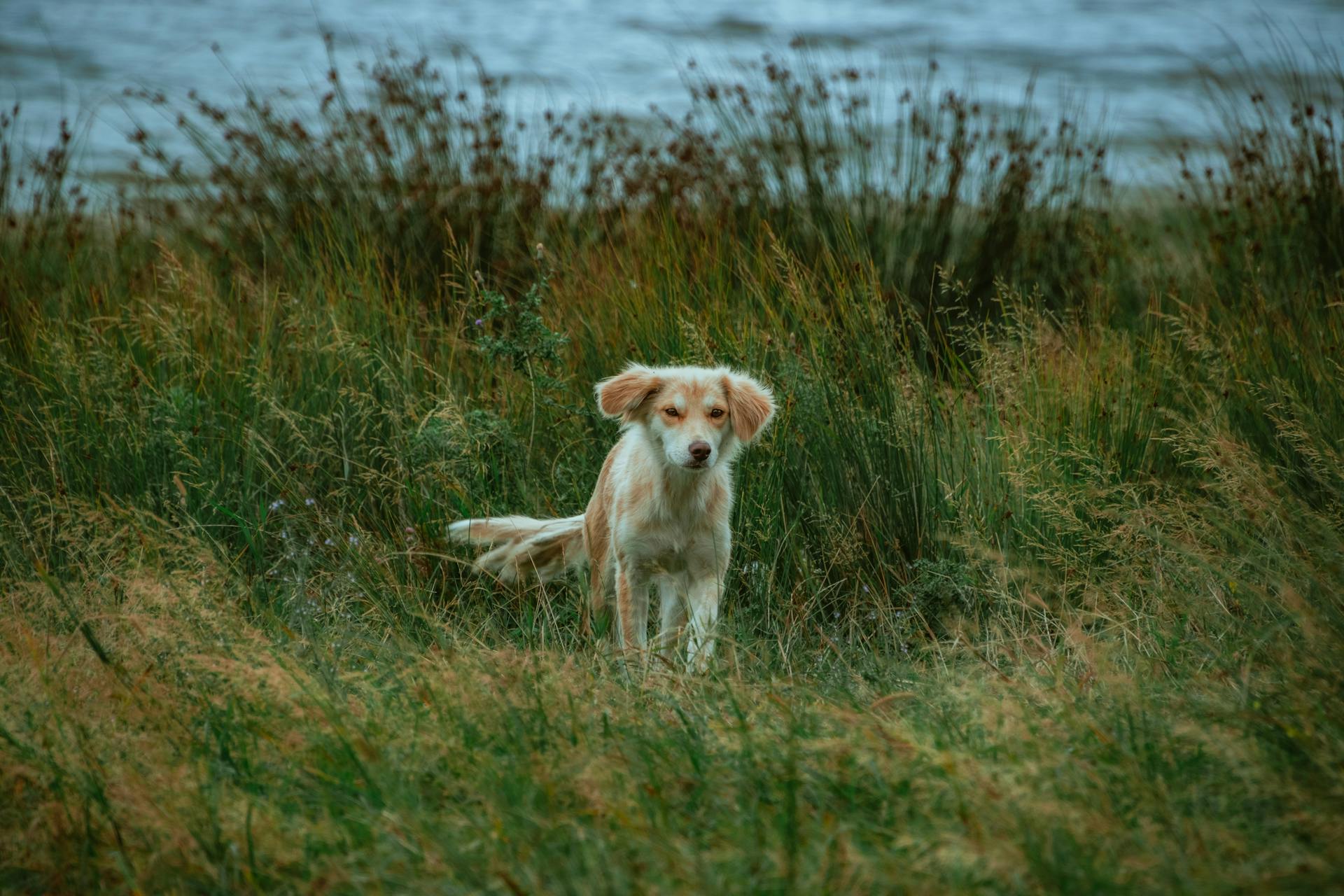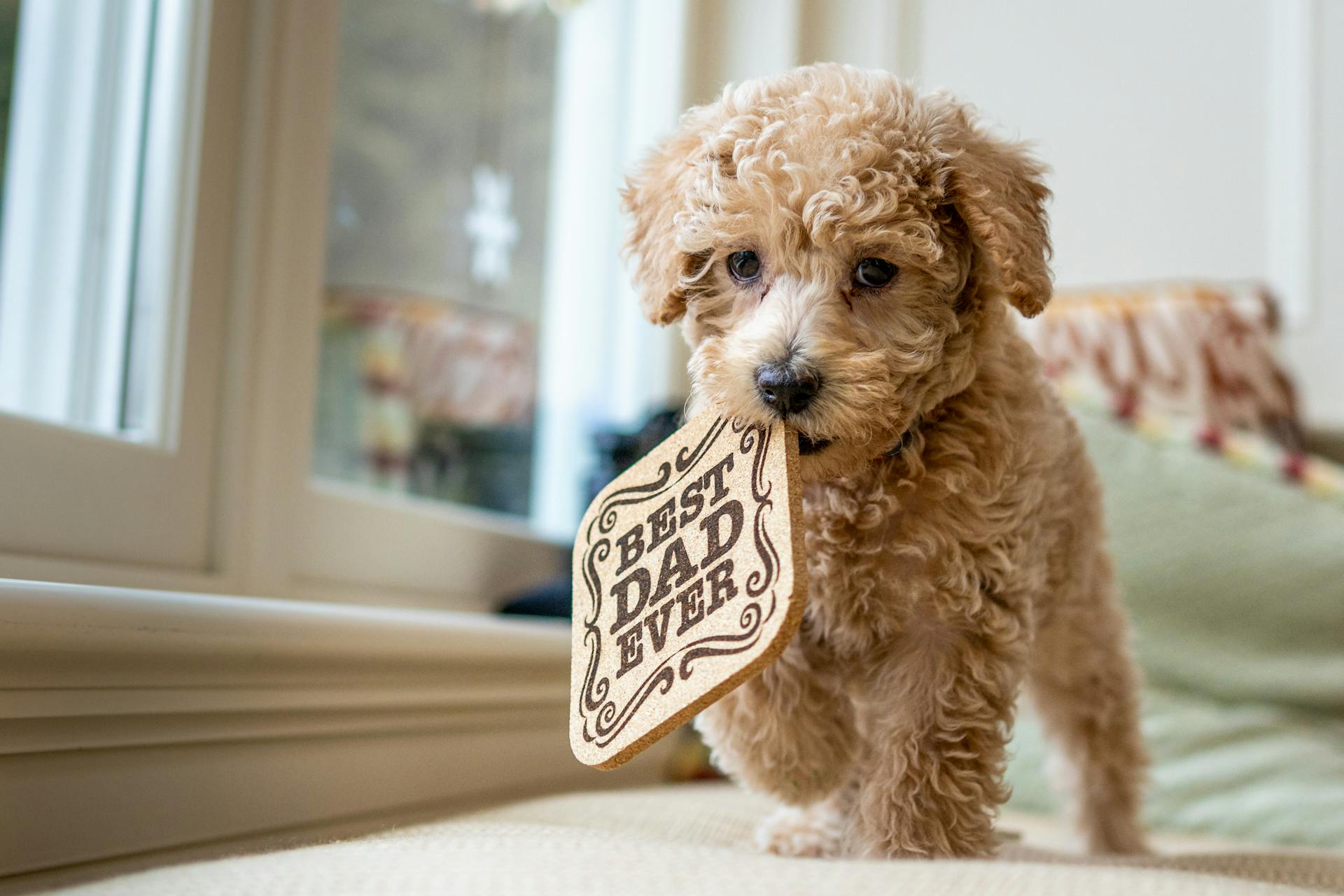
Choosing the right Irish Wolfhound breeder is a crucial decision that can impact your puppy's health, temperament, and overall well-being.
Irish Wolfhounds are a large breed with deep chests and long legs, requiring space to move around freely. They need regular exercise and mental stimulation to prevent boredom and destructive behavior.
The average lifespan of an Irish Wolfhound is 6-8 years, making their breeding process even more significant. Responsible breeders prioritize the health and well-being of their dogs, often investing time and resources into genetic testing and proper care.
A reputable breeder will be transparent about the puppy's ancestry, provide up-to-date vaccination records, and offer a written contract outlining guarantees and responsibilities.
Expand your knowledge: Irish Wolfhound Health Issues
Irish Wolfhound Breeders and Adoption
If you're looking for a reputable breeder for an Irish wolfhound puppy, be prepared to pay around $2,000, though prices can vary depending on bloodline and other factors.
A good breeder will take steps to ensure their puppies are as healthy as possible, which may result in higher prices. This is because Irish wolfhounds are prone to various health conditions that require regular veterinary checkups.
You won't often find Irish wolfhounds at animal shelters, but it's still worth checking your local shelters for a dog in need of a home.
Puppy Care and Health
Irish wolfhound puppies require lots of time and energy on your part, so make sure you're prepared to provide plenty of exercise and training opportunities.
To ensure your puppy stays healthy, it's essential to be aware of some common health issues that can affect Irish wolfhounds. These include bloat, heart disease, cancer, liver shunt, pneumonia, hip and elbow dysplasia, and eye problems such as cataracts and progressive retinal atrophy.
Some specific health concerns you should be aware of in Irish wolfhound puppies are:
- Bloat
- Heart disease (Irish Wolfhound type Cardiomyopathy and atrial fibrillation)
- Cancer (bone cancer)
- Liver shunt
- Pneumonia
- Hip and elbow dysplasia
- Eye issues (cataracts and progressive retinal atrophy)
Care
The care and attention you give your puppy is crucial for their development and overall health.
You must make sure your dog has the chance to stretch their legs every day. This can be as simple as a short walk around the block or a quick playtime in the backyard. Consistency is key when it comes to training and socialization, so stick to a routine that works for you and your furry friend. Fortunately, some breeds like the Irish wolfhound have fairly simple grooming needs, even for such big dogs.
Common Health Problems
Irish wolfhounds are generally a healthy breed, but they're prone to some hereditary health issues.
Bloat is a potentially fatal condition that occurs when the stomach twists as a result of excess food, gas, or fluid. Large and giant breeds like Irish wolfhounds are at greater risk of bloat.
Heart disease is another common issue in Irish wolfhounds, with them being prone to Irish Wolfhound type Cardiomyopathy (IWCM) and atrial fibrillation. Regular check-ups with a veterinarian can help monitor the condition of their heart.
Cancer is also a concern for Irish wolfhounds, with them having a higher risk of developing bone cancer at a younger age. This highlights the importance of regular health checks to catch any potential issues early on.
Some Irish wolfhounds may also be born with a liver shunt, which means veins that would normally bring blood to the liver end up bypassing the organ so the blood doesn’t get filtered by it.
Related reading: Rhodesian Ridgeback Problems
Here are some common health problems in Irish wolfhounds:
- Bloat
- Heart disease (Irish Wolfhound type Cardiomyopathy and atrial fibrillation)
- Cancer (bone cancer at a younger age)
- Liver shunt
- Hip and elbow dysplasia
- Eye issues (cataracts and progressive retinal atrophy)
These health problems can be managed with proper care, attention, and regular check-ups. By being aware of these potential issues, you can take steps to ensure your Irish wolfhound lives a happy and healthy life.
Irish Wolfhound Characteristics and Temperament
The Irish Wolfhound is a gentle giant, known for their friendly temperament and affectionate nature with their family.
They are generally very quiet and easygoing, which makes them a great companion for many people. However, they do need lots of space to exercise their large bodies, so be prepared to provide plenty of room for them to run around!
Irish Wolfhounds take a long time to mature as puppies, which means you'll have a large puppy that doesn't always act its age. This can be frustrating, especially if you're expecting adult behavior and a dog that isn't always rambunctious.
Despite their size, Irish Wolfhounds are not naturally aggressive dogs. They tend to get along with pretty much anyone - people, dogs, and even cats! However, they do have a clumsy phase in the first couple of years of their lives, so watch out for accidents around the house.
One thing to keep in mind is that Irish Wolfhounds aren't the best watchdogs, as they tend to make friends with almost everyone they meet. But, their vast size can be an automatic deterrent to others!
Broaden your view: Full Grown Irish Wolfhound
Featured Images: pexels.com


